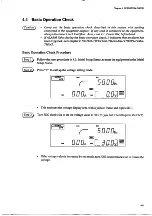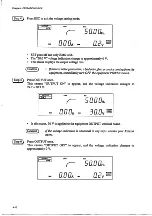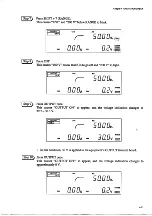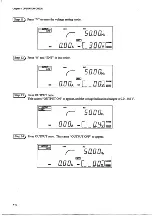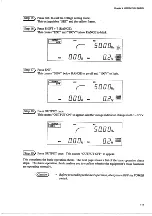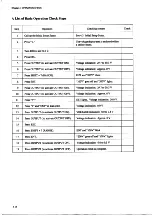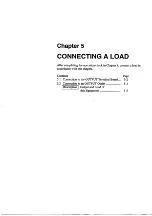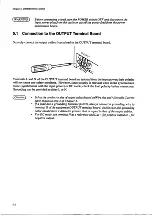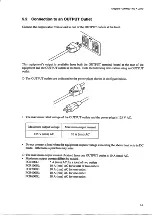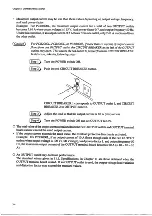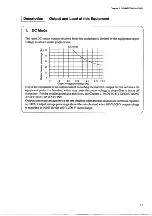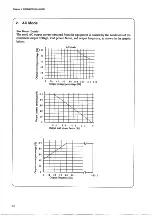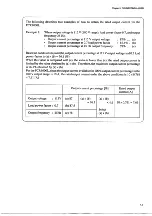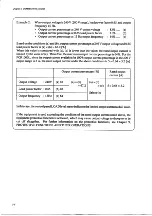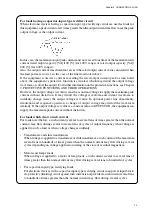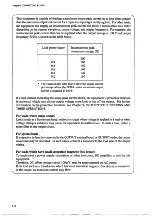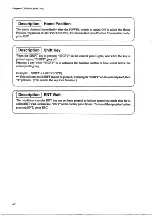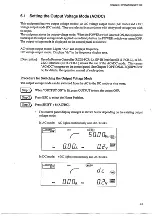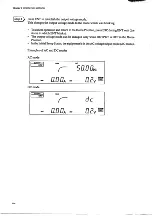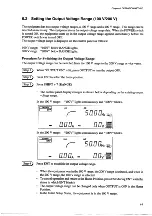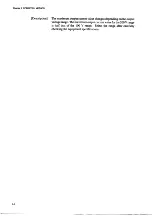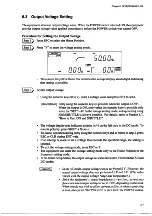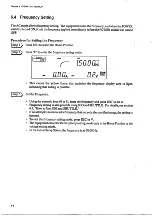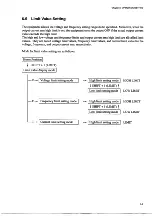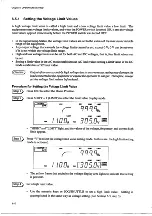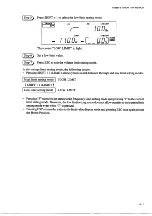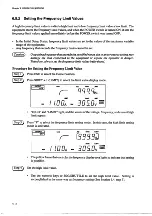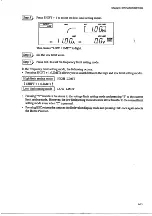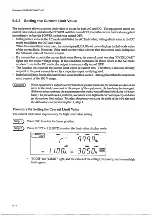
5-9
Chapter 5 CONNECTING A LOAD
For loads having a capacitor-input-type rectifier circuit
When electronic devices having a capacitor-input-type rectifying circuit are used as loads for
this equipment, a peak current a few times greater than the output current rms flows near the peak
output voltage as the output current.
In this case, the maximum output peak current must not exceed four times of the maximum rated
current (rated output capacity [VA]/100 [V] (for 100 V range) or rated output capacity [VA]/
200 [V] (for 200 V range)).
Also, the output current rms should not exceed the rated output current value calculated when
the load power-factor is 1 in the case of the liner load noted above.
If the equipment is used at a current exceeding the rated output current (peak or rms) noted
above, the equipment’s protective function is activated, which may distort the output voltage
waveform or cut off the output. For further information on the protective functions, see Chapter
9, PROTECTIVE FUNCTIONS AND THEIR OPERATIONS.
However, the output voltage (set value) must be a constant voltage to supply the maximum peak
current without distortion. It may distort the voltage waveform and current waveform to
suddenly change (raise) the output voltage set value. In optional power line abnormality
simulation and sequence operation, a change of output voltage may distort the waveform
similarly. If the output voltage set value is a constant value in OUTPUT ON, the equipment can
supply the maximum peak current without distortion.
For loads which draw a rush current
For loads noted below, a rush current (several to several tens of times greater than the normal
current) may flow during several to several tens of cycles of output frequency when voltage is
applied to such a load or when voltage changes suddenly.
• Transformers and slide transformers
When voltage is applied to a transformer or slide transformer, a rush current of the maximum
several tens to hundreds of times greater than the normal current may flow during several
cycles depending on voltage application timing or the state of residual magnetism.
• Motors and lamps loads
When voltage is applied to a motor or lamp loads, a rush current several to several tens of
times greater than the normal current may flow during several tens to hundreds of cycles.
• For capacitor-input-type rectifying loads
For electronic devices with a capacitor-input-type rectifying circuit in an power input block,
if a protective (limiting) circuit against rush current is not provided, a rush current several tens
to hundreds of times greater than the normal current may flow during several cycles.
Summary of Contents for PCR 1000L
Page 1: ......
Page 3: ......
Page 4: ......
Page 5: ......
Page 6: ......
Page 7: ......
Page 8: ......
Page 9: ......
Page 10: ......
Page 11: ......
Page 12: ......
Page 13: ......
Page 14: ......
Page 15: ......
Page 16: ......
Page 17: ......
Page 18: ......
Page 19: ......
Page 20: ......
Page 21: ......
Page 22: ......
Page 23: ......
Page 24: ......
Page 25: ......
Page 26: ......
Page 27: ......
Page 28: ......
Page 29: ......
Page 30: ......
Page 31: ......
Page 32: ......
Page 33: ......
Page 34: ......
Page 35: ......
Page 36: ......
Page 37: ......
Page 38: ......
Page 39: ......
Page 40: ......
Page 41: ......
Page 42: ......
Page 43: ......
Page 44: ......
Page 45: ......
Page 46: ......
Page 47: ......
Page 48: ......
Page 49: ......
Page 50: ......
Page 51: ......
Page 52: ......
Page 54: ......
Page 55: ......
Page 56: ......
Page 57: ......
Page 58: ......
Page 59: ......
Page 60: ......
Page 61: ......
Page 62: ......
Page 63: ......
Page 64: ......
Page 65: ......
Page 66: ......
Page 67: ......
Page 68: ......
Page 69: ......
Page 70: ......
Page 71: ......
Page 72: ......
Page 73: ......
Page 74: ......
Page 75: ......
Page 76: ......
Page 77: ......
Page 78: ......
Page 79: ......
Page 80: ......
Page 81: ......
Page 82: ......
Page 83: ......
Page 84: ......
Page 85: ......
Page 86: ......
Page 87: ......
Page 88: ......
Page 89: ......
Page 90: ......
Page 91: ......
Page 92: ......
Page 93: ......
Page 94: ......
Page 95: ......
Page 96: ......
Page 97: ......
Page 98: ......
Page 99: ......
Page 100: ......
Page 101: ......
Page 102: ......
Page 103: ......
Page 104: ......
Page 105: ......
Page 106: ......
Page 107: ......
Page 108: ......
Page 109: ......
Page 110: ......
Page 111: ......
Page 112: ......
Page 113: ......
Page 114: ......
Page 115: ......
Page 116: ......
Page 117: ......
Page 118: ......
Page 119: ......
Page 120: ......
Page 121: ......
Page 122: ......
Page 123: ......
Page 124: ......
Page 125: ......
Page 126: ......
Page 127: ......
Page 128: ......
Page 129: ......
Page 130: ......
Page 131: ......
Page 132: ......
Page 133: ......
Page 134: ......
Page 135: ......
Page 136: ......
Page 137: ......
Page 138: ......
Page 139: ......
Page 140: ......
Page 141: ......
Page 142: ......
Page 143: ......
Page 144: ......

